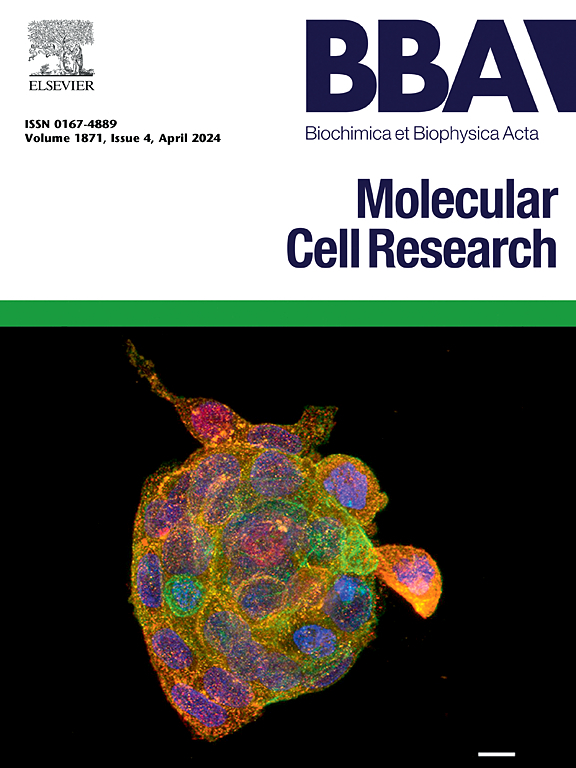发育中大鼠海马的线粒体动态和性别特异性反应:围产期窒息和间充质干细胞Secretome处理的影响
IF 4.6
2区 生物学
Q1 BIOCHEMISTRY & MOLECULAR BIOLOGY
Biochimica et biophysica acta. Molecular cell research
Pub Date : 2024-09-25
DOI:10.1016/j.bbamcr.2024.119851
引用次数: 0
摘要
目的:围产期窒息是新生儿出生时死亡的主要原因之一。存活者可以继续发育,但往往会留下长期后遗症。我们旨在确定围产期窒息对线粒体动力学的影响,以及间充质干细胞分泌物(MSC-S)治疗是否能减轻其有害影响:动物在分娩时窒息21分钟。材料与方法:动物在分娩时窒息 21 分钟,分娩后 2 小时鼻内注射间充质干细胞-S 或药物。在海马P1和P7时评估线粒体质量(D-loop,qPCR)、线粒体动力学蛋白(Drp1、Fis1和OPA1,Western印迹)、线粒体动力学(TOMM20,免疫荧光)以及线粒体膜电位(ΔΨm)(Safranin O):主要研究结果:围产期窒息会增加线粒体动力学蛋白 Drp1 和 S-OPA1 的水平(P1)和 Fis1 的水平(P7)。线粒体密度和质量在P1时下降。围产期窒息引起了性别差异,雌性在P7时L-OPA1增加,线粒体循环性增加。在雄性动物中,窒息暴露的动物在P7时表现出ΔΨm减少。MSC-S处理可使参与裂变的线粒体动力学蛋白水平恢复正常:这项研究为围产期窒息对发育中大脑线粒体动力学的影响以及间充质干细胞分泌组治疗提供了新的见解。研究还强调了将性别视为围产期脑损伤和治疗发展中的一个生物变量的相关性。这些发现有助于为受围产期窒息影响的婴儿开发有针对性的个性化疗法。本文章由计算机程序翻译,如有差异,请以英文原文为准。
Mitochondrial dynamics and sex-specific responses in the developing rat hippocampus: Effect of perinatal asphyxia and mesenchymal stem cell Secretome treatment
Aims
Perinatal asphyxia is one of the major causes of neonatal death at birth. Survivors can progress but often suffer from long-term sequelae. We aim to determine the effects of perinatal asphyxia on mitochondrial dynamics and whether mesenchymal stem cell secretome (MSC-S) treatment can alleviate the deleterious effects.
Materials and methods
Animals were subjected to 21 min of asphyxia at the time of delivery. MSC-S or vehicle was intranasally administered 2 h post-delivery. Mitochondrial mass (D-loop, qPCR), mitochondrial dynamics proteins (Drp1, Fis1 and OPA1, Western blot), mitochondrial dynamics (TOMM20, Immunofluorescence), as well as mitochondrial membrane potential (ΔΨm) (Safranin O) were evaluated at P1 and P7 in the hippocampus.
Key findings
Perinatal asphyxia increased levels of mitochondrial dynamics proteins Drp1 and S-OPA1 at P1 and Fis1 at P7. Mitochondrial density and mass were decreased at P1. Perinatal asphyxia induced sex-specific differences, with increased L-OPA1 in females at P7 and increased mitochondria circularity. In males, asphyxia-exposed animals exhibited a reduced ΔΨm at P7. MSC-S treatment normalised levels of mitochondrial dynamics proteins involved in fission.
Significance
This study provides novel insights into the effects of perinatal asphyxia on mitochondrial dynamics in the developing brain and on the therapeutic opportunities provided by mesenchymal stem cell secretome treatment. It also highlights on the relevance of considering sex as a biological variable in perinatal brain injury and therapy development. These findings contribute to the development of targeted, personalised therapies for infants affected by perinatal asphyxia.
求助全文
通过发布文献求助,成功后即可免费获取论文全文。
去求助
来源期刊
CiteScore
10.00
自引率
2.00%
发文量
151
审稿时长
44 days
期刊介绍:
BBA Molecular Cell Research focuses on understanding the mechanisms of cellular processes at the molecular level. These include aspects of cellular signaling, signal transduction, cell cycle, apoptosis, intracellular trafficking, secretory and endocytic pathways, biogenesis of cell organelles, cytoskeletal structures, cellular interactions, cell/tissue differentiation and cellular enzymology. Also included are studies at the interface between Cell Biology and Biophysics which apply for example novel imaging methods for characterizing cellular processes.

 求助内容:
求助内容: 应助结果提醒方式:
应助结果提醒方式:


